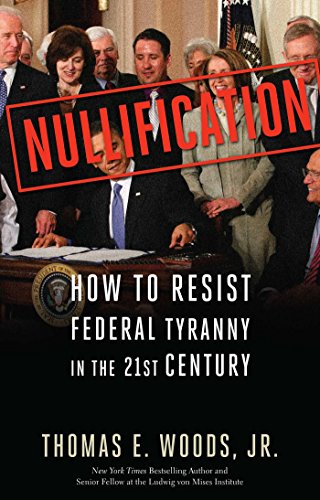Recently by Declan McCullagh: Amazon Fights Demand for CustomerRecords
A new U.S. Senate bill would grant the president far-reaching emergency powers to seize control of or even shut down portions of the Internet.
The legislation announced Thursday says that companies such as broadband providers, search engines, or software firms that the government selects "shall immediately comply with any emergency measure or action developed" by the Department of Homeland Security. Anyone failing to comply would be fined.
 Nullification: How to ...
Best Price: $2.00
Buy New $8.34
(as of 05:25 UTC - Details)
Nullification: How to ...
Best Price: $2.00
Buy New $8.34
(as of 05:25 UTC - Details)
That emergency authority would allow the federal government to "preserve those networks and assets and our country and protect our people," Joe Lieberman, the primary sponsor of the measure and the chairman of the Homeland Security committee, told reporters on Thursday. Lieberman is an independent senator from Connecticut who caucuses with the Democrats.
Because there are few limits on the president’s emergency power, which can be renewed indefinitely, the densely worded 197-page bill (PDF) is likely to encounter stiff opposition.
TechAmerica, probably the largest U.S. technology lobby group, said it was concerned about "unintended consequences that would result from the legislation’s regulatory approach" and "the potential for absolute power." And the Center for Democracy and Technology publicly worried that the Lieberman bill’s emergency powers "include authority to shut down or limit Internet traffic on private systems."
The idea of an Internet "kill switch" that the president could flip is not new. A draft Senate proposal that CNET obtained in August allowed the White House to "declare a cybersecurity emergency," and another from Sens. Jay Rockefeller (D-W.V.) and Olympia Snowe (R-Maine) would have explicitly given the government the power to "order the disconnection" of certain networks or Web sites.
 Direct Citizen Action:...
Best Price: $0.47
Buy New $5.75
(as of 09:05 UTC - Details)
Direct Citizen Action:...
Best Price: $0.47
Buy New $5.75
(as of 09:05 UTC - Details)
On Thursday, both senators lauded Lieberman’s bill, which is formally titled the Protecting Cyberspace as a National Asset Act, or PCNAA. Rockefeller said "I commend" the drafters of the PCNAA. Collins went further, signing up at a co-sponsor and saying at a press conference that "we cannot afford to wait for a cyber 9/11 before our government realizes the importance of protecting our cyber resources."
 The Revolution: A Mani...
Best Price: $1.99
Buy New $6.99
(as of 11:00 UTC - Details)
The Revolution: A Mani...
Best Price: $1.99
Buy New $6.99
(as of 11:00 UTC - Details)
Under PCNAA, the federal government’s power to force private companies to comply with emergency decrees would become unusually broad. Any company on a list created by Homeland Security that also "relies on" the Internet, the telephone system, or any other component of the U.S. "information infrastructure" would be subject to command by a new National Center for Cybersecurity and Communications (NCCC) that would be created inside Homeland Security.
The only obvious limitation on the NCCC’s emergency power is one paragraph in the Lieberman bill that appears to have grown out of the Bush-era flap over warrantless wiretapping. That limitation says that the NCCC cannot order broadband providers or other companies to "conduct surveillance" of Americans unless it’s otherwise legally authorized.
Lieberman said Thursday that enactment of his bill needed to be a top congressional priority. "For all of its ‘user-friendly’ allure, the Internet can also be a dangerous place with electronic pipelines that run directly into everything from our personal bank accounts to key infrastructure to government and industrial secrets," he said. "Our economic security, national security and public safety are now all at risk from new kinds of enemies – cyber-warriors, cyber-spies, cyber-terrorists and cyber-criminals."
A new cybersecurity bureaucracy
Lieberman’s proposal would form a powerful and extensive new Homeland Security bureaucracy around the NCCC, including "no less" than two deputy directors, and liaison officers to the Defense Department, Justice Department, Commerce Department, and the Director of National Intelligence. (How much the NCCC director’s duties would overlap with those of the existing assistant secretary for infrastructure protection is not clear.)
June 19, 2010





